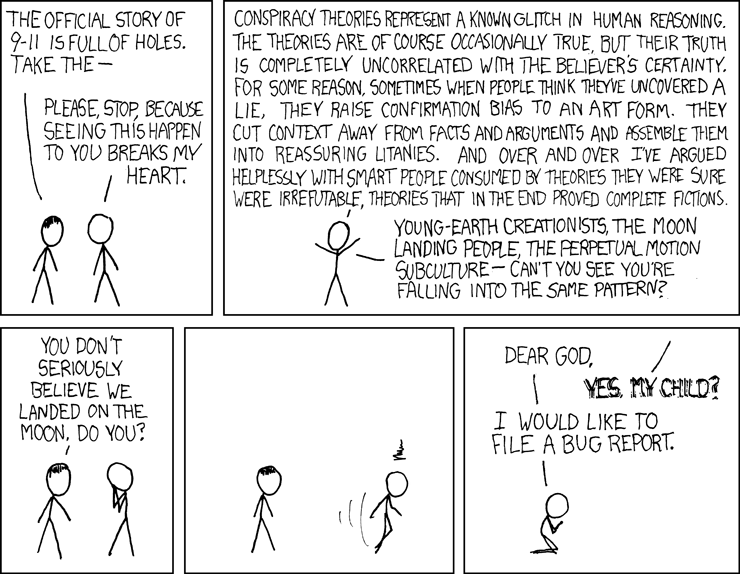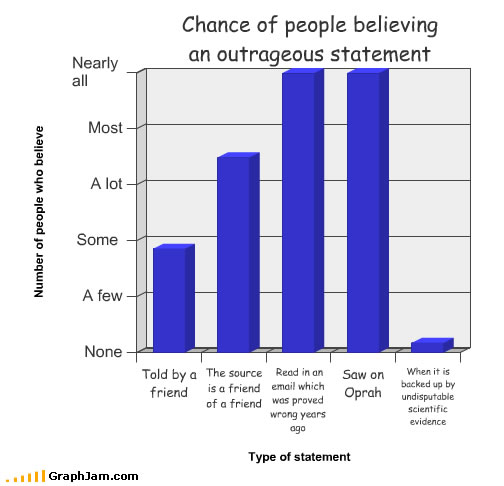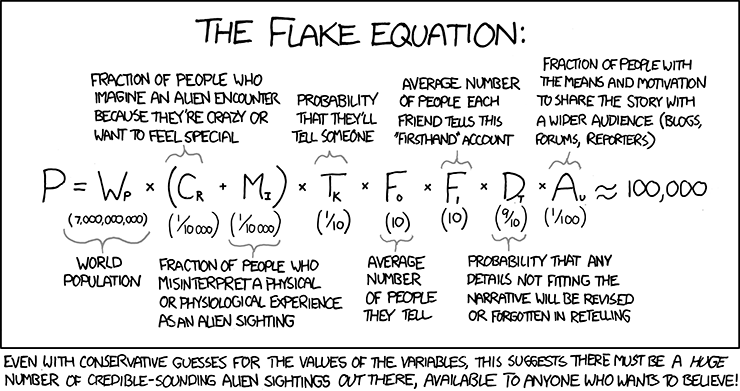What do you think? Is not caring about whether you're telling the truth worse than deliberately lying?
Sunday, April 29, 2012
B.S.
Here's the video of Jon Stewart interviewing Harry Frankfurt about his book On Bullshit (which you can read online for free here).
What do you think? Is not caring about whether you're telling the truth worse than deliberately lying?
What do you think? Is not caring about whether you're telling the truth worse than deliberately lying?
Saturday, April 28, 2012
Final Exam
Just a reminder: the final exam is Tuesday, May 1st. For the 8:00 class, the final is from 8:00-10:00 a.m., and for the 9:25 class, it is from 10:15 a.m.-12:15 p.m.
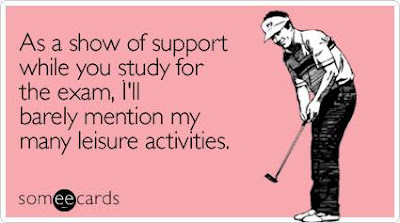

Friday, April 27, 2012
Last Chance
Just a reminder that the course evaluation for this class is only open two more days (today and tomorrow). If you haven't done it yet, go do it! Here are instructions:

1. Go to http://cp.rowan.edu/cp/.
2. Click "Student Self-Service" icon.
3. Click "Access Banner Services - Secure Area - login required"
4. Enter User ID and PIN.
5. Click "Personal Information".
6. Click "Answer a Survey".
7. Click on one of the student evaluations for your classes.
8. Complete the student evaluation.
9. Click “Survey Complete” to submit your completed student evaluation.
10. Repeat for other Spring 2012 classes.

Thursday, April 26, 2012
Open-mindedness
Here's an entertaining 10-minute video on open-mindedness, science, and paranormal beliefs.
I like the definition of open-mindedness offered by this video: it is being open to new evidence. This brings with it a willingness to change your mind... but only if new evidence warrants such a change.
Changing your mind has gotten a bum rap lately: flip-flopping can kill a political career. But willingness to change your mind is an important intellectual virtue that is valued by scientists.
I like the definition of open-mindedness offered by this video: it is being open to new evidence. This brings with it a willingness to change your mind... but only if new evidence warrants such a change.
Changing your mind has gotten a bum rap lately: flip-flopping can kill a political career. But willingness to change your mind is an important intellectual virtue that is valued by scientists.
Labels:
as discussed in class,
I'M-SPECIAL-ism,
intellectual honesty,
links,
psychological impediments
Wednesday, April 25, 2012
Intellectual Humility
I think there’s an important connection between intellectual honesty and humility. A simple goal of this class is to get us all to recognize what counts as good evidence and what counts as bad evidence for a claim. I think we've gotten pretty good at this so far. But this doesn’t guarantee that we’ll care about the difference once we figure it out.
Getting us to care is the real goal. We should care about good evidence. We should care about evidence and arguments because they get us closer to the truth. When we judge an argument to be overall good, THE POWER OF LOGIC COMPELS US to believe the conclusion. If we are presented with decent evidence for some claim, but still stubbornly disagree with this claim for no strong reason, we are just being irrational. Worse, we’re effectively saying that the truth doesn’t matter to us.
Instead of resisting, we should be open-minded. We should be willing to challenge ourselves--seriously challenge ourselves--and allow new evidence change our current beliefs if it warrants it. We should be open to the possibility that we’ve currently gotten something wrong. This is how comedian Todd Glass puts it:
Here are the first two paragraphs of an interesting article on this:

Getting us to care is the real goal. We should care about good evidence. We should care about evidence and arguments because they get us closer to the truth. When we judge an argument to be overall good, THE POWER OF LOGIC COMPELS US to believe the conclusion. If we are presented with decent evidence for some claim, but still stubbornly disagree with this claim for no strong reason, we are just being irrational. Worse, we’re effectively saying that the truth doesn’t matter to us.
Instead of resisting, we should be open-minded. We should be willing to challenge ourselves--seriously challenge ourselves--and allow new evidence change our current beliefs if it warrants it. We should be open to the possibility that we’ve currently gotten something wrong. This is how comedian Todd Glass puts it:
Here are the first two paragraphs of an interesting article on this:
Last week, I jokingly asked a health club acquaintance whether he would change his mind about his choice for president if presented with sufficient facts that contradicted his present beliefs. He responded with utter confidence. “Absolutely not,” he said. “No new facts will change my mind because I know that these facts are correct.”Ironically, having extreme confidence in oneself is often a sign of ignorance. Remember, in many cases, such stubborn certainty is unwarranted.
I was floored. In his brief rebuttal, he blindly demonstrated overconfidence in his own ideas and the inability to consider how new facts might alter a presently cherished opinion. Worse, he seemed unaware of how irrational his response might appear to others. It’s clear, I thought, that carefully constructed arguments and presentation of irrefutable evidence will not change this man’s mind.

Labels:
as discussed in class,
I'M-SPECIAL-ism,
intellectual honesty,
links,
more cats? calm down sean,
psychological impediments
Tuesday, April 24, 2012
Class Canceled (4/24)
I am sick again, so our class is canceled for today (Tuesday, April 24th). Sorry for the late notice.
Homework #3 is still due at the beginning of class on Thursday April 26th.

Homework #3 is still due at the beginning of class on Thursday April 26th.

Practical Advice
How can we counteract these cognitive biases we're learning about? Examining the way we think and becoming more aware of our biases is a good start, but is not in itself a solution.
One big point is to own our fallibility. Awareness of our limits and biases should lead us to lower our degree of confidence in many of our beliefs--particularly deeply held opinions and stances on controversial issues. Simply put, we should get in the habit of admitting (and sincerely believing) that there's a real chance that we're wrong.
Here are two other big, simple points I think make for some great practical advice:
One big point is to own our fallibility. Awareness of our limits and biases should lead us to lower our degree of confidence in many of our beliefs--particularly deeply held opinions and stances on controversial issues. Simply put, we should get in the habit of admitting (and sincerely believing) that there's a real chance that we're wrong.
Here are two other big, simple points I think make for some great practical advice:
- Get Unfamiliar! A
 ctively seek out sources that you disagree with. We tend to surround ourselves with like-minded people and consume like-minded media. This hurts our chances of discovering that we've made a mistake. In effect, it puts up a wall of rationalization around our preexisting beliefs to protect them from any countervailing evidence.
ctively seek out sources that you disagree with. We tend to surround ourselves with like-minded people and consume like-minded media. This hurts our chances of discovering that we've made a mistake. In effect, it puts up a wall of rationalization around our preexisting beliefs to protect them from any countervailing evidence. - Focus on What Hurts! When we do check out our opponents, it tends to be the obviously fallacious straw men rather than sophisticated sources that could legitimately challenge our beliefs. But this is bad! We should focus on the best points in the arguments against what you believe. Our opponents' good points are worth more attention than their obviously bad points. Yet we often focus on their mistakes rather than the reasons that hurt our case the most.
Monday, April 23, 2012
Changing Habits
"If you want to change a habit, …don’t try and change everything at once. Instead, figure out what the cue is, figure out what the reward is and find a new behavior that is triggered by that cue and delivers that same reward. "
— Charles Duhigg, author of The Power of Habit, on Fresh Air
Less Wrong has several great posts on effective techniques for breaking bad habits and replacing them with better ones:
- The Science of Rationality
- Scientific Self-Help: The State of Our Knowledge
- Build Small Skills in the Right Order
- How to Beat Procrastination
Metacognition
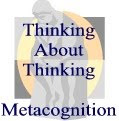 There's a name for all the studying of our natural thinking styles we've been doing in class lately: metacognition. When we think about the ways we think, we can vastly improve our learning abilities. This is what the Owning Our Ignorance club is about.
There's a name for all the studying of our natural thinking styles we've been doing in class lately: metacognition. When we think about the ways we think, we can vastly improve our learning abilities. This is what the Owning Our Ignorance club is about.I think this is one of the most valuable concepts we're learning all semester. So if you read any links, I hope it's these two:
Sunday, April 22, 2012
Status Quo Bias
Lazy, inert humans:
- If it already exists, we assume it's good.
- Our mind works like a computer that depends on cached responses to thoughtlessly complete common patterns.
- NYU psychologist John Jost does a lot of work on system justification theory. This is our tendency to unconsciously rationalize the status quo, especially unjust social institutions. Scarily, those of us oppressed by such institutions have a stronger tendency to justify their existence.
- Jost has a new book on this stuff. Here's a video dialogue about his research:
Saturday, April 21, 2012
Let's All Nonconform Together
If you like these links, I'll let you in my exclusive club:
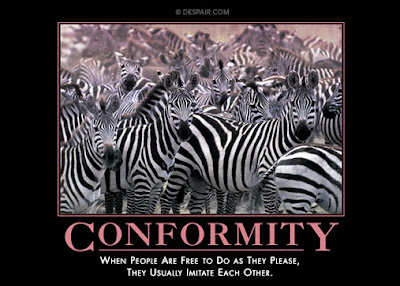
- On the influence of your in-groups and the formation of your identity: "If you want to set yourself apart from other people, you have to do things that are arbitrary, and believe things that are false." (from Paul Graham's "Lies We Tell Our Kids.")
- Here's a summary of two recent studies which suggest that partisan mindset stems from a feeling of moral superiority.
- Here's that poll showing the Republican-Democrat switcharoo regarding their opinion of Fed Chairman Ben Bernanke when the executive office changed parties.
- Our political loyalties also influence our view on the economy.
- Here's an article about a cool study on the relationship between risk and provincialism.
- Conformity hurts the advancement of science.

Friday, April 20, 2012
Paper Guideline
Due Date: the beginning of class on Tuesday, May 1st, 2012
Worth: 10% of final grade
Length/Format: Papers must be typed, and must be between 400-800 words long. Provide a word count on the first page of the paper. (Most programs like Microsoft Word & WordPerfect have automatic word counts.)
Assignment:
1) Pick an article from a newspaper, magazine, or journal in which an author presents an argument for a particular position.There are some links to potential articles here. I recommend choosing from those articles, though you are also free to choose an article on any topic you want.
PRO TIP: It’s easier to write this paper on an article with a BAD argument. Try finding a poorly-reasoned article!
If you don’t chose from the articles on the blog, you must show Sean your article by Tuesday, April 24th for approval. The main requirement is that the article present an argument. One place to look for such articles is the Opinion page of a newspaper. Here’s a short list of some other good sources:
Worth: 10% of final grade
Length/Format: Papers must be typed, and must be between 400-800 words long. Provide a word count on the first page of the paper. (Most programs like Microsoft Word & WordPerfect have automatic word counts.)
Assignment:
1) Pick an article from a newspaper, magazine, or journal in which an author presents an argument for a particular position.There are some links to potential articles here. I recommend choosing from those articles, though you are also free to choose an article on any topic you want.
PRO TIP: It’s easier to write this paper on an article with a BAD argument. Try finding a poorly-reasoned article!
If you don’t chose from the articles on the blog, you must show Sean your article by Tuesday, April 24th for approval. The main requirement is that the article present an argument. One place to look for such articles is the Opinion page of a newspaper. Here’s a short list of some other good sources:
- The New Yorker
- Slate
- New York Review of Books
- London Review of Books
- Times Literary Supplement
- Boston Review
- Atlantic Monthly
- The New Republic
- The Weekly Standard
- The Nation
- Reason
- Dissent
- First Things
- Mother Jones
- National Journal
- The New Criterion
- Wilson Quarterly
- The Philosophers' Magazine
2) In the essay, first briefly explain the article’s argument in your own words. What’s the position that the author is arguing for? What are the reasons the author offers as evidence for her or his conclusion? What type of argument does the author provide? In other words, provide a brief summary of the argument.
NOTE: This part of your paper shouldn’t be very long. I recommend making this only one paragraph of your paper.
3) In the essay, then evaluate the article’s argument. Overall, is this a good or bad argument? Why or why not? Systematically evaluate the argument:
- Check each premise: is each premise true? Are any false? Questionable? (Do research if you have to in order to determine whether the premises are true.)
- Then check the structure of the argument. Do the premises provide enough support for the conclusion?
- Does the argument contain any fallacies? If so, which one(s)? Exactly how does the argument commit it/them?
NOTE: This should be the main part of your paper. Focus most of your paper on evaluating the argument.
4) If your paper is not on one of the articles linked to on the course blog, attach a copy of the article to your paper when you hand it in. (Save trees! Print it on few pages!)
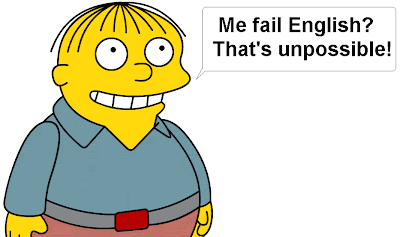
Labels:
as discussed in class,
assignments,
logistics
Thursday, April 19, 2012
Possible Paper Articles
Here are some links to a variety of articles you could use for your paper on explaining and evaluating an article's argument. I strongly recommend using one of these articles, since many (the first 8 in particular) contain bad arguments:

- Down With Facebook!: it's soooo lame
- Is Facebook Making Us Lonely? generational I'M-SPECIAL-ism
- Do Fish Feel Pain?: "it's a tricky issue, so I'll go with my gut"
- In the Basement of the Ivory Tower: are some people just not meant for college?
- Study Says Social Conservatives Are Dumb: but that doesn't mean they're wrong
- A New Argument Against Gay Marriage: hetero marriage is unique & indispensable
- Ben Stein's Confession for the Holidays: taking sides on the war on christmas
- Get Over Ferris Bueller: it's an overrated movie
- You Don't Deserve Your Salary: no one does
- The Financial Crisis Killed Libertarianism: if it wasn't dead to begin with
- How'd Economists Get It So Wrong?: Krugman says the least wrong was Keynes
- An Open Letter to Krugman: get to know your field
- Consider the Lobster: David Foster Wallace ponders animal ethics
- Are Dolphins People?: an ocean full of sea-people
- The Dark Art of Interrogation: Bowden says torture is necessary
- The Idle Life is Worth Living: in praise of laziness
- Should I Become a Professional Philosopher?: maybe not (update)
- Blackburn Defends Philosophy: it beats being employed

Homework #3: Advertisement
Homework #3 is due at the beginning of class on Thursday, April 26th. Your assignment is to choose an ad (on TV or from a magazine or wherever) and evaluate it from a logic & reasoning perspective.
- First, very briefly explain the argument that the ad offers to sell its product.
- Then, list and explain the mistakes in reasoning that the ad commits.
- Then, list and explain the psychological ploys the ad uses (what psychological impediments does the ad try to exploit?).
- Attach (if it's from a newspaper or magazine) or briefly explain the ad.
Wednesday, April 18, 2012
Wished Pots Never Boil
Here is a hodgepodge of links on some psychological impediments we're discussing recently:
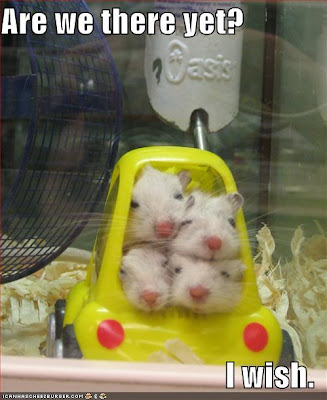
- If you're a fan of The Secret, you should beware that it's basic message is wishful thinking run amok.
- Courtroom judges have pretty serious biases: they're more lenient earlier in the day and right after a break. Scary!!!!
- Teachers have biases, too: we're self-serving and play favorites.
- Why don't we give more aid to those in need? Psychological impediments are at least partly to blame.
- Why do we believe medical myths (like "vitamin C cures the common cold," or "you should drink 8 glasses of water a day")? Psychological impediments, of course!
- Wikipedia has a great list of common misconceptions.

Tuesday, April 17, 2012
Quiz You Twice, Shame on You
Quiz #2 will be held at the beginning of class on Thursday, April 19th. It will last 25 minutes, and is worth 7.5% of your overall grade. The quiz is on everything we've discussed since the midterm, including these fallacies:

- Appeal to Authority
- False Dilemma
- Slippery Slope
- The Naturalistic Fallacy
- Direct Experience
- Memory
- Anecdotal Evidence & Hearsay
- Confirmation & Disconfirmation Bias
- Statistical Biases
- Overconfidence (I'M-SPECIAL-ism)
- Social Pressures

Monday, April 16, 2012
Most Published Science is False
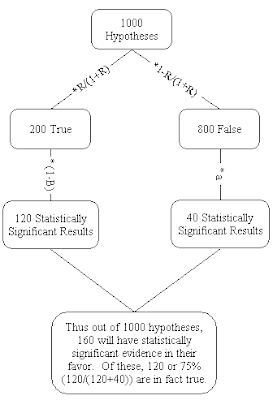
Beware: as the flowchart above suggests, most published scientific research is probably false. Seriously, there's a pretty big decline effect problem in science.
This is why you should trust meta-analyses (scientific surveys of all the related studies on a particular issue) over any individual study. You should also trust settled science (the stuff you'd find in a textbook) more than any new scientific research. And you should be especially wary of any science explained on the news.
Labels:
as discussed in class,
authority,
links,
news,
psychological impediments
Sunday, April 15, 2012
The Smart Bias
Oddly, the I'M-SPECIAL-ism bias seems to increase the more intelligent you are. Studies suggest that the smarter and more experienced you are, the more overconfident you're likely to become. In particular, we seem to believe that our intelligence makes us immune to biases. But that's just not true! The philosopher Nigel Warburton puts it nicely:
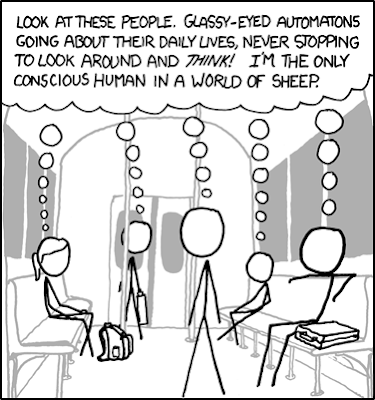
“Many of us would like to believe that intellect banishes prejudice. Sadly, this is itself a prejudice.”

Saturday, April 14, 2012
No, I'm Not
One of my favorite topics is I'M-SPECIAL-ism. Psychological research has repeatedly shown that most Americans overestimate their own abilities. This is one of the biggest hurdles to proper reasoning: the natural tendency to think that I'm more unique--smarter, or more powerful, or prettier, or whatever--than I really am.
You may have noticed that one of my favorite blogs is Overcoming Bias. Their mission statement is sublimely anti-I'M-SPECIAL-ist:
So I hope you'll join the campaign to end I'M-SPECIAL-ism.
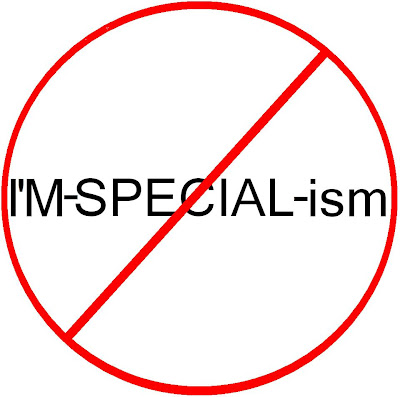
You may have noticed that one of my favorite blogs is Overcoming Bias. Their mission statement is sublimely anti-I'M-SPECIAL-ist:
"How can we better believe what is true? While it is of course useful to seek and study relevant information, our minds are full of natural tendencies to bias our beliefs via overconfidence, wishful thinking, and so on. Worse, our minds seem to have a natural tendency to convince us that we are aware of and have adequately corrected for such biases, when we have done no such thing."This may sound insulting, but one of the goals of this class is getting us to recognize that we're not as smart as we think we are. All of us. You. Me! That one. You again. Me again!
So I hope you'll join the campaign to end I'M-SPECIAL-ism.

Friday, April 13, 2012
Jock Math
Statistics in sports is all the rage lately. Here are some links on the topic.
- Statistical analysis can justify counterintuitive decisions, like going for it instead of punting on 4th down... though don't expect the fans to buy that fancy math learnin'.
- There are a lot of odd statistical myths about what happens on the day of the Super Bowl that deserve to be debunked.
- "Realistic Announcer Shouting How Kevin Durant Making His Last 4 Shots Has No Bearing On Whether He Will Make Next Shot"
- "Cornell Drains Fun Out Of Cinderella Run By Explaining How On A Long Enough Timeline The Improbable Becomes Probable"
- That radio show I love recently devoted an entire episode to probability:
- That other radio show I love ran a great 2-part series on the screening for diseases called "You Are Pre-Diseased":
- Here's a cool visualization of the president's promise to cut $100 million from the U.S. budget:
Labels:
as discussed in class,
audio,
links,
math,
psychological impediments,
videos
Thursday, April 12, 2012
The Importance of Being Stochastic
Statistical reasoning is incredibly important. The vast majority of advancements in human knowledge (all sciences, social sciences, medicine, engineering...) is the result of using some kind of math. If I had to recommend one other course that could improve your ability to learn in general, it'd be Statistics.
Anyway, here is a bunch of links:
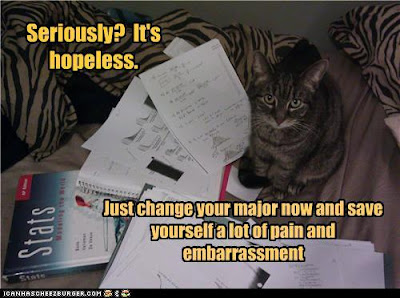
Anyway, here is a bunch of links:
- Most of us are pretty bad at statistical reasoning.
- Here's a review of a decent book (The Drunkard's Walk: How Randomness Rules Our Lives) on our tendency to misinterpret randomness as if it's an intentional pattern.
- Controversial claim alert! This ability to see patterns where there are none may explain why so many of us believe in god (see section 5 in particular).
- It also may explain why we think small schools do a better job at educating students. They probably don't.
- What was that infinite monkey typewriter thing we were talking about in class?
- What's up with that recent recommendation that routine screenings for breast cancer should wait until your 50s rather than 40s? Math helps explain it.

Tuesday, April 10, 2012
Change We Mistakenly Believe In
Here's a common example of confirmation bias and selective memory most of us have experienced: do you think we should stick with our first instinct when answering a test question? Most of us think we should. After all, so many of us remember lots of times where we initially circled the right answer, only to cross it out and choose another.
The problem with this is that research suggests that our first instincts are no more reliable than our second-guessing. Why does the myth persist? Well, we're more likely to remember the times we second-guessed and got it wrong than the times we second-guessed and got it right. Switching away from the right answer is just so frustrating that it's a more memorable event. So if I got back the following test...
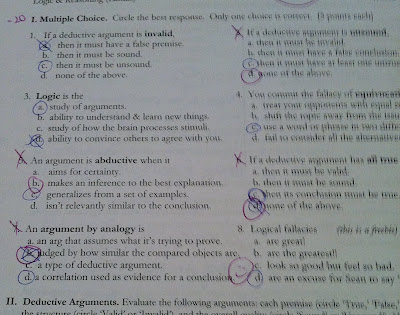 ...I'd probably only notice that I changed #6 and #7 to the wrong answer. I'd be much less likely to notice that I changed #1 and #3 to the right answer.
...I'd probably only notice that I changed #6 and #7 to the wrong answer. I'd be much less likely to notice that I changed #1 and #3 to the right answer.
The problem with this is that research suggests that our first instincts are no more reliable than our second-guessing. Why does the myth persist? Well, we're more likely to remember the times we second-guessed and got it wrong than the times we second-guessed and got it right. Switching away from the right answer is just so frustrating that it's a more memorable event. So if I got back the following test...

The Conspiracy Bug
Here's an article on a 9/11 conspiracy physicist that brings up a number of issues we're discussing in class (specifically appealing to authority and confirmation bias). I've quoted an excerpt of the relevant section on the lone-wolf semi-expert (physicist) versus the overwhelming consensus of more relevant experts (structural engineers):
While there are a handful of Web sites that seek to debunk the claims of Mr. Jones and others in the movement, most mainstream scientists, in fact, have not seen fit to engage them.And one more excerpt on reasons to be skeptical of conspiracy theories in general:
"There's nothing to debunk," says Zdenek P. Bazant, a professor of civil and environmental engineering at Northwestern University and the author of the first peer-reviewed paper on the World Trade Center collapses.
"It's a non-issue," says Sivaraj Shyam-Sunder, a lead investigator for the National Institute of Standards and Technology's study of the collapses.
Ross B. Corotis, a professor of civil engineering at the University of Colorado at Boulder and a member of the editorial board at the journal Structural Safety, says that most engineers are pretty settled on what happened at the World Trade Center. "There's not really disagreement as to what happened for 99 percent of the details," he says.
One of the most common intuitive problems people have with conspiracy theories is that they require positing such complicated webs of secret actions. If the twin towers fell in a carefully orchestrated demolition shortly after being hit by planes, who set the charges? Who did the planning? And how could hundreds, if not thousands of people complicit in the murder of their own countrymen keep quiet? Usually, Occam's razor intervenes.
Another common problem with conspiracy theories is that they tend to impute cartoonish motives to "them" — the elites who operate in the shadows. The end result often feels like a heavily plotted movie whose characters do not ring true.
Then there are other cognitive Do Not Enter signs: When history ceases to resemble a train of conflicts and ambiguities and becomes instead a series of disinformation campaigns, you sense that a basic self-correcting mechanism of thought has been disabled. A bridge is out, and paranoia yawns below.
Monday, April 9, 2012
Rationalizing Away from the Truth
A big worry that the confirmation and disconfirmation biases raise is the difficulty of figuring out what counts as successful, open-minded reasoning, versus what amounts to after-the-fact rationalization of preexisting beliefs. Here are some links on our tendency to rationalize rather than reason:
- Recent moral psychology suggests that we often simply rationalize our snap moral judgments. (Or worse: we actually undercut our snap judgments to defend whatever we want to do.)
- The great public radio show Radio Lab devoted an entire show to the psychology of our moral decision-making:
- Humans' judge-first, rationalize-later approach stems in part from the two competing decision-making styles inside our heads.
- For more on the dual aspects of our minds, I strongly recommend reading one of the best philosophy papers of 2008: "Alief and Belief" by Tamar Gendler.
- Here's a video dialogue between Gendler and her colleague (psychologist Paul Bloom) on her work:
Saturday, April 7, 2012
Friday, April 6, 2012
More to Forget
Here's more on the less of memory:
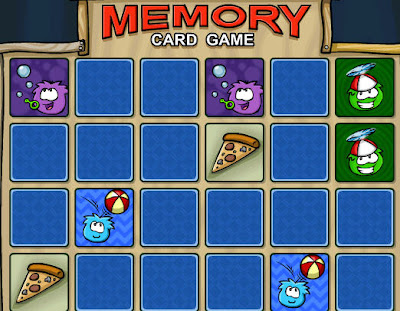
- Here's an overview on the way our memory is faulty by psychologist Gary Marcus. He's written a book called Kluge: The Haphazard Construction of the Human Mind.
- Even strong "flashbulb memories" like what you were doing on 9/11 are not very accurate.
- One leading expert on memory is psychologist Elizabeth Loftus (she's mentioned in our textbook). Here is a pair of articles that summarize her research on false memories, and here's a video of her presenting on it.
- Here's an article on the unreliability of eyewitness identification.
- Here's an article that suggests many jurors seem to prefer eyewitness testimony over forensic evidence. Given how unreliable our memories are, that's pretty scary. Here's a quote:
"Despite all our scientific know-how, jurors weighing life and death decisions still crave what Leone calls the 'human element:' the act of watching another person testify and deciding if they’re telling the truth.
"As these witnesses enter the courtroom, a hush often falls on the gallery. Jurors — bored by days of dry testimony given by well-rehearsed experts — lean forward in their seats, pens at the ready to take notes about what the eyewitness has to say. They have seen this moment on television, too, and it’s usually really, really interesting."

Thursday, April 5, 2012
Filling in Memory
Here's a section (pages 78-80) from psychologist Dan Gilbert's great book Stumbling on Happiness about how memory works:
The preview cuts off at the bottom of page 80. Here's the rest from that section:
Fine. Here's Dan Gilbert on The Colbert Report:
The preview cuts off at the bottom of page 80. Here's the rest from that section:
"...reading the words you saw. But in this case, your brain was tricked by the fact that the gist word--the key word, the essential word--was not actually on the list. When your brain rewove the tapestry of your experience, it mistakenly included a word that was implied by the gist but that had not actually appeared, just as volunteers in the previous study mistakenly included a stop sign that was implied by the question they had been asked but that had not actually appeared in the slides they saw.Too many words, Sean! Can't you just put up a video? You better make it funny, too!
"This experiment has ben done dozens of times with dozens of different word lists, and these studies have revealed two surprising findings. First, people do not vaguely recall seeing the gist word and they do not simply guess that they saw the gist word. Rather, they vividly remember seeing it and they feel completely confident that it appeared. Second, this phenomenon happens even when people are warned about it beforehand. Knowing that a researcher is trying to trick you into falsely recalling the appearance of a gist word does not stop that false recollection from happening."
Fine. Here's Dan Gilbert on The Colbert Report:
Wednesday, April 4, 2012
Course Evaluation
The course evaluation for this class is now open. Here are instructions on how to do this:
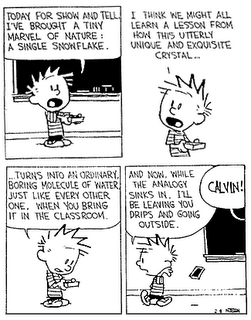
1. Go to http://cp.rowan.edu/cp/.
2. Click "Student Self-Service" icon.
3. Click "Access Banner Services - Secure Area - login required"
4. Enter User ID and PIN.
5. Click "Personal Information".
6. Click "Answer a Survey".
7. Click on one of the student evaluations for your classes.
8. Complete the student evaluation.
9. Click “Survey Complete” to submit your completed student evaluation.
10. Repeat for other Spring 2012 classes.

Tuesday, April 3, 2012
Misidentification
Here's an excellent, short video explanation of the unreliability of memory that ends with a dog licking peanut butter off a guy's face:
And here's a more serious video on the tragedy of misidentifying a suspect:
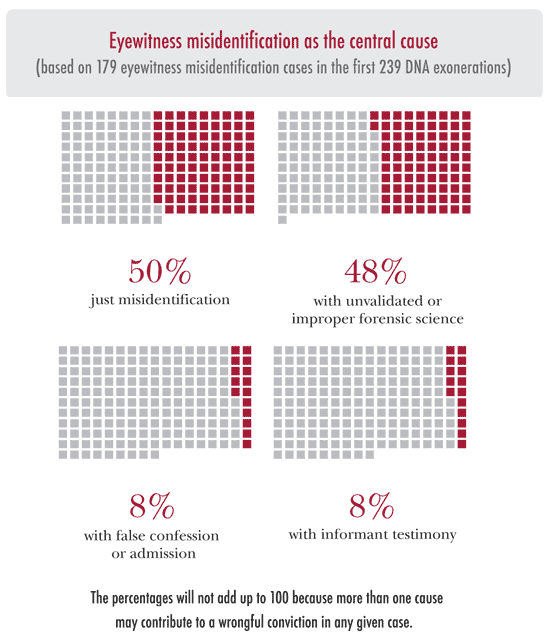
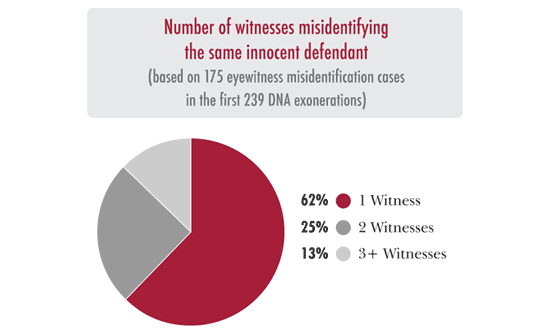
And here's a more serious video on the tragedy of misidentifying a suspect:


Labels:
as discussed in class,
links,
memory,
psychological impediments,
videos
Monday, April 2, 2012
Direct Experience
Here are two videos on stuff we're talking about in class this week. First, watch this:
Next, watch this:
Finally, here's an article on this issue. Still trust your direct experience?

Next, watch this:
Finally, here's an article on this issue. Still trust your direct experience?

Subscribe to:
Posts (Atom)

